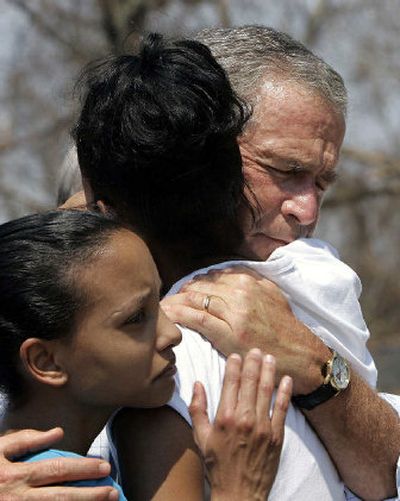Bush gets eyeful, pledges help

WASHINGTON – Amid sharp criticism of the slow federal response to Hurricane Katrina, President Bush toured storm-ravaged regions of the Gulf Coast on Friday, promising swift results. Four days after the storm devastated vast stretches of the Gulf states, the president spent about six hours getting a close-up view of the damage by helicopter and on foot in Mobile, Ala., Biloxi, Miss., and New Orleans.
“We’re making progress,” Bush said just before he returned to Washington, about two hours past his scheduled departure.
“I’m not going to forget what I’ve seen,” he said. “I understand that devastation requires more than one day’s attention. It’s going to require the attention of this country for a long period of time.”
Before leaving the White House on Friday morning, Bush acknowledged that the results of the federal effort so far had been “not acceptable.”
At each stop, Bush exchanged hugs and patted people on the back. More than once, he elicited smiles, even laughter, from the now-homeless.
Bush’s first stop was Mobile. There, in a Coast Guard hangar, military officers, rescue personnel and the governors of Alabama and Mississippi gave him accounts of the hurricane and its aftermath, using maps spread over a large table.
When it was time for him to speak, tears welled in Bush’s eyes.
“We are going to restore order in the city of New Orleans,” he said. “The people of this country expect there to be law and order, and we’re going to work hard to get it.”
After the rescue operations are complete and order is restored, Bush said, “then we’re going to help these communities rebuild.”
In Biloxi, Bush’s motorcade slowly made its way through an obliterated city, in which it was forced at several points to zig-zag down narrow streets to avoid downed trees and other debris.
During a walking tour, the president was approached by two sisters, one of whom wept as she spoke of having lost everything but the clothes she wore. Bush hugged them and then slung an arm around each of the women as they walked down the road together, chatting.
After greeting more people at a Salvation Army trailer, the president told the traveling press pool that, from close up, the damage was “worse than imaginable. I don’t think anybody can be prepared for the vastness of this destruction.”
“People here are going to see compassion pour in here,” Bush added. “We’re going to clean all this mess up.”
During a question-and-answer session, he emphatically rejected the notion that the rescue and relief effort was hampered by the deployment of troops and equipment to Iraq.
“I just completely disagree,” the president said. “We’ve got plenty of resources to do both.”